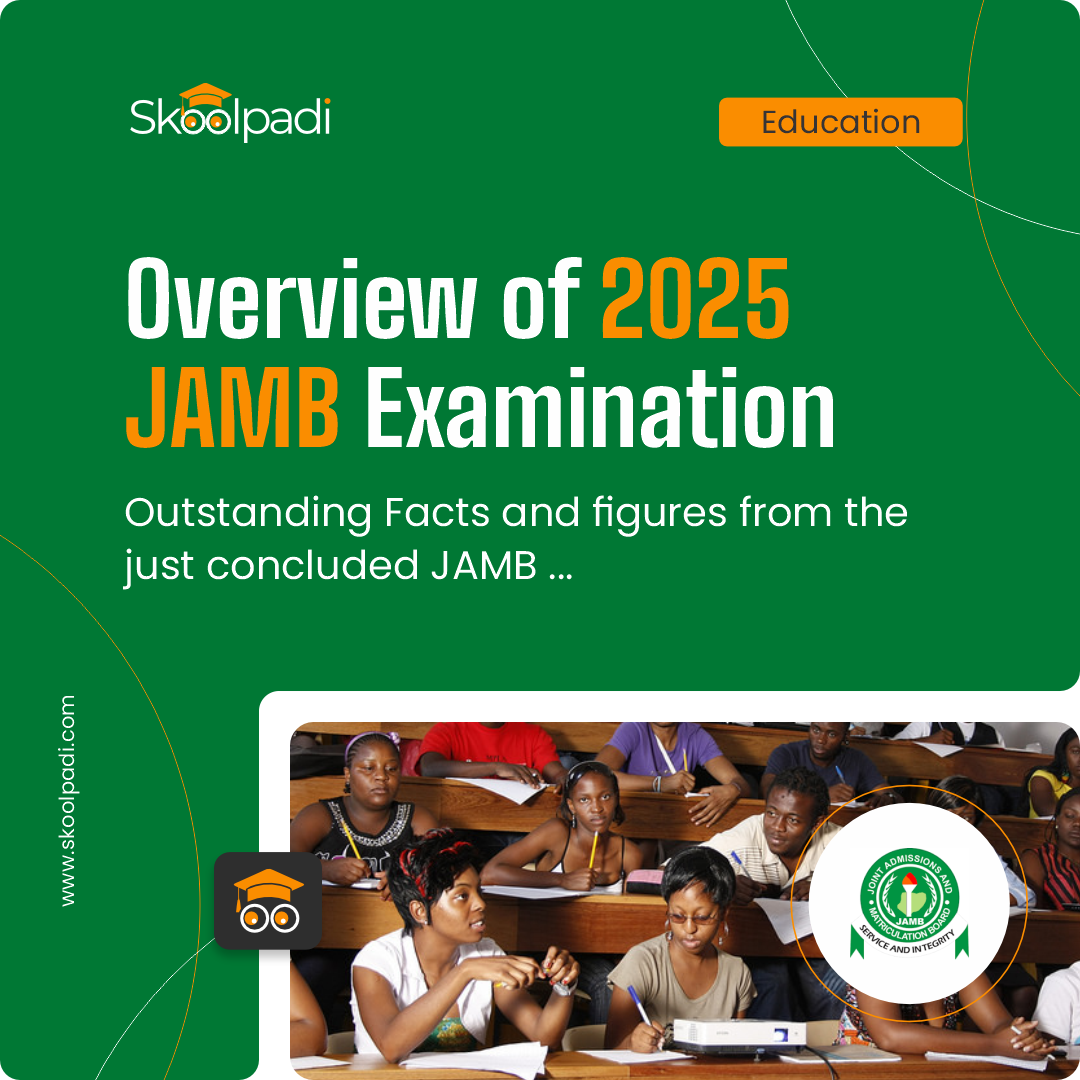The 2025 Joint Admissions and Matriculation Board (JAMB) Unified Tertiary Matriculation Examination (UTME) has been a significant event in Nigeria’s tertiary education admission process, with notable achievements and challenges. Below is an overview based on credible sources, highlighting key aspects, successes, and challenges.
Overview of the 2025 JAMB Examination
The 2025 UTME, conducted by JAMB, is a computer-based test (CBT) required for admission into Nigerian universities, polytechnics, and colleges of education. The examination assesses candidates’ knowledge, speed, and accuracy across four subjects, including English, with a score range of 0–400. Registration for the UTME began on February 3, 2025, and ended on March 5, 2025, while the examination commenced on April 25, 2025, and concluded on May 5, 2025, for foreign centers. A mock examination was held on April 10, 2025, to familiarize candidates with the CBT format. Direct Entry (DE) registration started on March 12, 2025, and continued beyond April 7, 2025, to allow verification of A-level results.
Key statistics include:
– Registered Candidates: Approximately 2,030,900 candidates registered for the 2025 UTME.
– Candidates Examined: About 1,635,517 candidates sat for the exam, with 399,886 absentees.
– Special Needs Candidates: 648,359 candidates with special needs were accommodated.
– Examination Centers: JAMB accredited 870 CBT centers nationwide, an increase from 747 in 2024, to enhance capacity and reduce technical issues…
The examination process involved strict protocols, such as mandatory National Identification Number (NIN) submission for profile creation and biometric verification to curb fraud. JAMB also introduced innovations like enhanced examination item generation and stricter CBT center accreditation to improve efficiency and transparency.
Outstanding Successes
1. Inclusive Education Initiatives:
– JAMB demonstrated a commitment to inclusive education by conducting tailored UTME sessions for candidates with special needs, such as visual impairment, autism, and Down syndrome, across 11 specialized JAMB Equal Opportunity Group (JEOG) centers. Over 500 candidates participated nationwide, with 92 at the Kano Centre alone. JAMB provided free accommodation, feeding, and transportation, and refunded registration fees for candidates with five O-level credits. A notable success story includes a former Kano Centre candidate scoring over 240 and now studying at Bayero University.
– Special provisions, like a separate mock trial for candidates under 16 and accommodations for deaf/mute candidates, ensured broader access.
2. Technological and Procedural Improvements:
– JAMB’s cutting-edge technology to prevent examination malpractices received praise from the Senate Committee on Education, highlighting the board’s robust systems for ensuring integrity.
– The mock UTME, with 126,181 candidates successfully participating, tested innovations and prepared candidates for the CBT environment. Results were promptly released, accessible via SMS to 55019 or 66019.
– The increase in accredited CBT centers to 870 minimized technical disruptions and improved accessibility.
3. Combating Fraud and Malpractice:
– JAMB arrested 27 impersonators and delisted four CBT centers for failing technical checks, reinforcing examination integrity.according to lindaikeji other sources..
– Enhanced verification processes for DE candidates, including pre-verification of A-level qualifications, addressed issues of fake results, with institutions required to verify certificates directly with JAMB.
4. Timely Communication and Resources:
– JAMB released the 2025 syllabus, recommended textbooks, and areas of concentration, enabling candidates to focus their preparation effectively. These resources were accessible online, aiding structured study.
– Clear guidelines on registration, cut-off marks (140 for universities, 100 for polytechnics/colleges of education), and examination dates were communicated, reducing confusion.
Outstanding Challenges
1. Technical and Logistical Issues:
– Network failures at some CBT centers during registration caused delays in biometric verification and ePIN validation, preventing some candidates from registering before the March 8 deadline.
– The mock UTME faced challenges, with 73,844 candidates absent and 88 failing biometric verification, indicating persistent logistical and technical hurdles.
– Delays during the mock examination were reported, attributed to new features being tested, though JAMB acknowledged and apologized for these.
2. Access and Infrastructure Constraints:
– Despite the increase in CBT centers, accommodating over 2 million candidates across 870 centers (averaging 2,335 candidates per center) required multiple batches over approximately 10 days, straining infrastructure.
– Candidates in rural areas or with limited computer literacy faced challenges adapting to the CBT format, as Nigeria’s digital infrastructure remains uneven..Source
3. Fraudulent Practices by CBT Centers:
– Some CBT centers used substandard facilities to gain accreditation, prompting JAMB to conduct further checks and disapprove such centers, which delayed the registration start to February 3, 2025..source.
– The issue of fake A-level results for DE admissions persisted, with tertiary institutions implicated in presenting fraudulent candidates, necessitating extended verification periods…source.
4. Candidate Preparedness and Absentees:
– The high absentee rate (399,886 candidates) suggests issues like economic constraints, inadequate preparation, or logistical barriers, which JAMB has yet to fully address.
– Biometric verification challenges, such as those caused by henna on candidates’ fingers, hindered some candidates’ ability to register or participate..source
Conclusion
The 2025 JAMB UTME has made strides in enhancing accessibility, integrity, and efficiency, particularly through inclusive education efforts, technological advancements, and robust anti-fraud measures. However, challenges like technical glitches, infrastructure strain, and fraudulent practices by some CBT centers remain. JAMB’s proactive steps, such as increasing CBT centers and refining verification processes, aim to address these issues, but sustained efforts are needed to ensure a seamless experience for all candidates, especially in underserved areas. The Senate’s push for more CBT centers may further alleviate capacity constraints in future examinations.
For further details, candidates can visit the official JAMB website…source.
What was your 2025 JAMB experience? Comment below.


